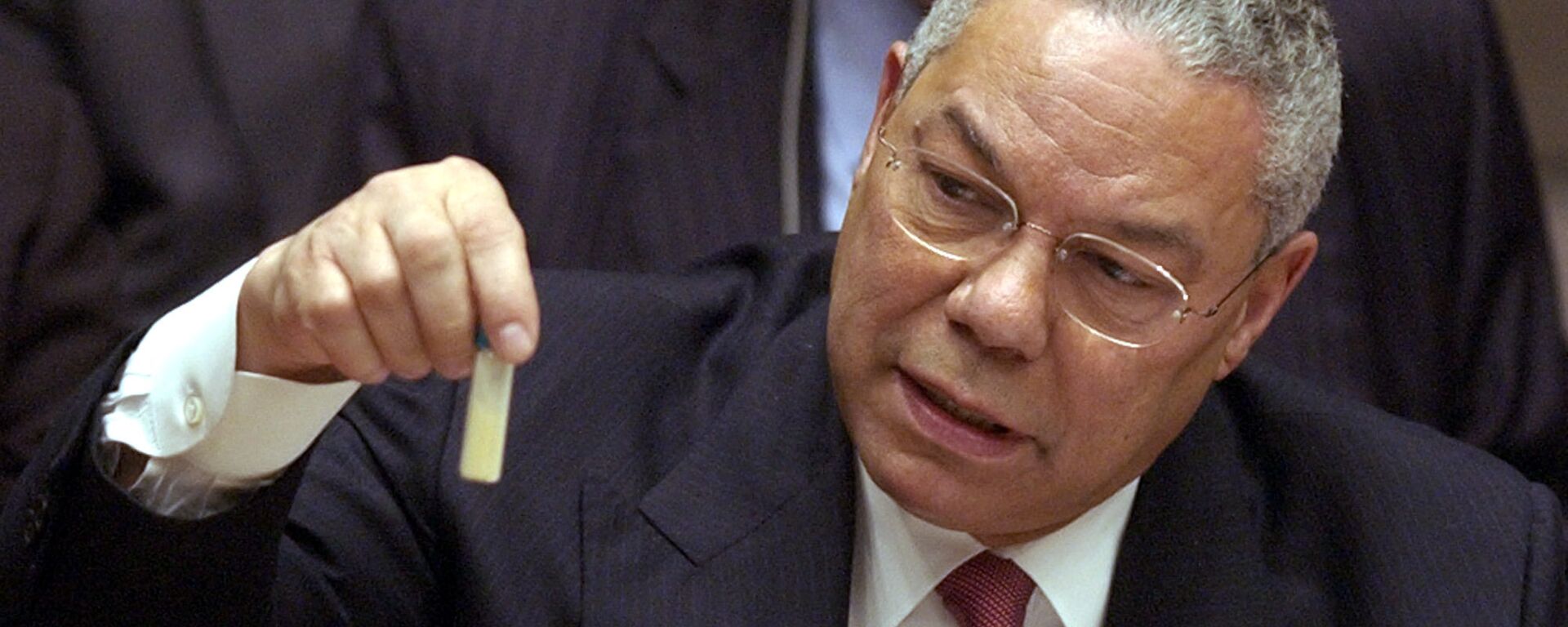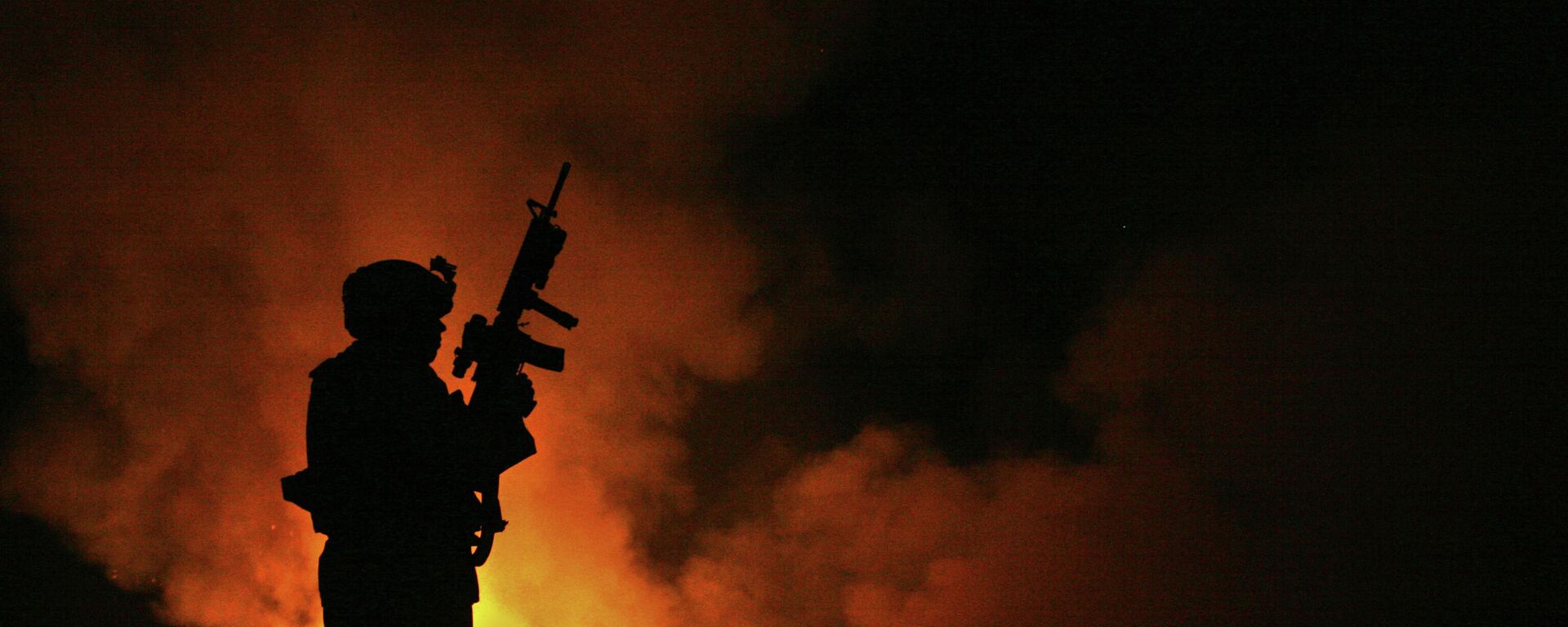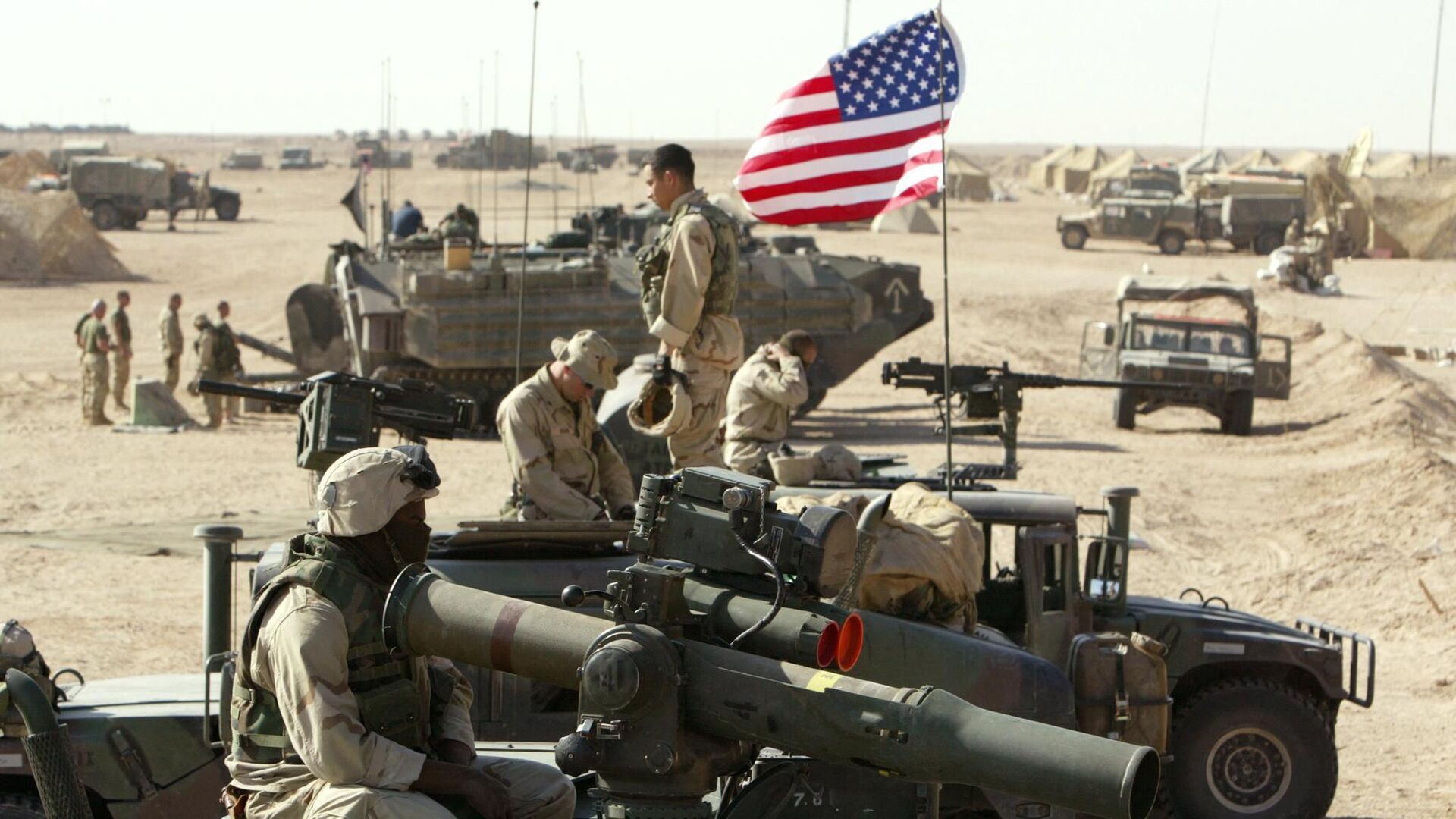https://sputnikglobe.com/20230205/iraqi-ex-intelligence-officer-breaks-down-us-2003-invasion-preparations-1106972600.html
Iraqi Ex-Intelligence Officer Breaks Down US 2003 Invasion Preparations
Iraqi Ex-Intelligence Officer Breaks Down US 2003 Invasion Preparations
Sputnik International
On February 5, 2003, US Secretary of State Colin Powell gave a speech to the UN Security Council in which he made the case for the US invasion of Iraq, claiming that the country possessed weapons of mass destruction.
2023-02-05T15:00+0000
2023-02-05T15:00+0000
2023-03-17T12:25+0000
us
iraq
iraq war
2003 invasion of iraq
war in iraq
invasion of iraq
20 years since us invasion of iraq
https://cdn1.img.sputnikglobe.com/img/07e7/02/04/1106973503_0:0:2048:1153_1920x0_80_0_0_78814e0a4c09150567eac421e4ff900a.jpg
Sputnik spoke to Khaled Al-Douri, a key official of the US section of Iraqi intelligence before the 2003 invasion, to discuss Powell's lies at the UN and their consequences. In 2003, Powell held up a prop vial that he claimed could contain anthrax as "proof" that Iraq was developing WMDs.Sputnik: Many people see the events of February 5, 2003, as the beginning of the US plan to destroy Iraq. How would you characterize them?Al-Douri: It is certainly a dark day for the Iraqi people. But as far as we know from the intercepted documents, the US began working on a plan to invade Iraq as early as 1988, a few months after the end of the Iran-Iraq War. The Americans were simply unhappy with the serious military power left in Iraq at the end of the war and Saddam's unwillingness to eliminate Iraq's ballistic missile system. A pretext for an invasion was created and the invasion took place.Sputnik: So was Powell's vial speech on February 5 the culmination of the US conspiracy against Iraq?Al-Douri: Exactly. Up to that point, there had been several UN inspections in Iraq: it turned out later that they had given all the data needed to prepare for the falsification of the vial and the subsequent invasion. They gave it not only to the USA but also to the UK as well. But the arguments of the Americans didn't convince, for example, a number of Arab countries. Only the West believed them. However, at that UN Security Council meeting, they failed to get a resolution to send troops to Iraq. But certainly, that day turned out to be a point of no return.Sputnik: It's been established that a certain spy in Iraq informed German officials of some bioweapon labs. What can you tell us about this case?Al-Douri: The fact is that German intelligence did not really trust the words of [Rafid Ahmed Alwan] al-Janabi, whom they had previously recruited. But they passed this information on to the Americans: there was a convenient pretext for the invasion. After the war, al-Janabi returned to Iraq and publicly admitted that all the information he had given at the time was a figment of his imagination and untrue. This was in 2011. In any case, it cannot be argued that it was al-Janabi's lies that destroyed Iraq. The West used him.Sputnik: It is clear that Powell's accusations were lies. But what about the British statements?Al-Douri: The lies of Tony Blair, the British prime minister at the time, are no less appalling. He said that Iraq could prepare its missiles with chemical and biological warheads and hit London within 40 minutes. He openly lied and intimidated his fellow citizens to justify the impending occupation. Blair was, after all, a servile follower of Washington, but he was also interested in invading Iraq himself. One wonders how the subjects of Great Britain, years later, have understood nothing.Sputnik: Could the UN Security Council have somehow prevented the invasion of Iraq?Al-Douri: No, the US was much stronger and more powerful in its actions. As soon as the US admitted that it had invaded Iraq and now controlled all of its territory, the UN Security Council began to deal with the new situation and sent its envoy to Iraq. But what could he do against the Americans? Nothing, of course, except the appearance of peacemaking.Sputnik: Do you think the invasion of Iraq was the first symbol of a unipolar world and US hegemony?Al-Douri: If you look at the slogans of the US Secretary of State at that time (e.g. the "New Middle East"), this is exactly what they wanted to demonstrate. The invasion of Iraq was the first step to demonstrate the unrestrained and unpunished US policy. The next step was to divide Syria and then other countries in the region. When the stay of American troops in Iraq became quite costly, they began to send terrorists into the country and prepare the ground for a major collapse. Then they began to say that Iraq was a breeding ground for terrorism. But the Americans themselves did everything for that.Sputnik: What did the US gain by invading Iraq?Al-Douri: America announced its withdrawal from Iraq in 2011 because of the heavy losses it suffered at the hands of the Iraqi resistance. Nevertheless, it has kept all the political elites under its influence - the occupation is over, but the protectorate is not. The US got money from the resale of Iraqi oil and is still getting it. They are not happy with the growing influence of Iran in the country, because they look at us as a colony. But they are not welcome here; the Iraqis are saying on every possible platform that America has done a reckless act and destroyed the sovereignty of Iraq.
https://sputnikglobe.com/20230205/making-the-case-for-war-20-years-ago-colin-powell-lied-to-the-un-1106970009.html
https://sputnikglobe.com/20230205/lie-of-the-century-how-powells-speech-changed-the-middle-east-for-decades-1106972051.html
iraq
Sputnik International
feedback@sputniknews.com
+74956456601
MIA „Rossiya Segodnya“
2023
Sputnik International
feedback@sputniknews.com
+74956456601
MIA „Rossiya Segodnya“
News
en_EN
Sputnik International
feedback@sputniknews.com
+74956456601
MIA „Rossiya Segodnya“
Sputnik International
feedback@sputniknews.com
+74956456601
MIA „Rossiya Segodnya“
us invasion of iraq, colin powell, colin powell speech to un, colin powell lies, colin powell tube, colin powell vial, vial of anthrax, white powder
us invasion of iraq, colin powell, colin powell speech to un, colin powell lies, colin powell tube, colin powell vial, vial of anthrax, white powder
Iraqi Ex-Intelligence Officer Breaks Down US 2003 Invasion Preparations
15:00 GMT 05.02.2023 (Updated: 12:25 GMT 17.03.2023) On February 5, 2003, US Secretary of State Colin Powell gave a speech to the UN Security Council in which he made the case for the US invasion of Iraq, claiming that the country possessed weapons of mass destruction. While the US started a devastating and costly war in the Middle East, the WMDs were never found.
Sputnik spoke to Khaled Al-Douri, a key official of the US section of Iraqi intelligence before the 2003 invasion, to discuss
Powell's lies at the UN and their consequences. In 2003, Powell held up a prop vial that he claimed could contain anthrax as "proof" that Iraq was developing WMDs.
Sputnik: Many people see the events of February 5, 2003, as the beginning of the US plan to destroy Iraq. How would you characterize them?
Al-Douri: It is certainly a dark day for the Iraqi people. But as far as we know from the intercepted documents, the US began working on a plan to invade Iraq as early as 1988, a few months after the end of the Iran-Iraq War. The Americans were simply unhappy with the serious military power left in Iraq at the end of the war and Saddam's unwillingness to eliminate Iraq's ballistic missile system. A pretext for an invasion was created and the invasion took place.
Sputnik: So was Powell's vial speech on February 5 the culmination of the US conspiracy against Iraq?
Al-Douri: Exactly. Up to that point, there had been several UN inspections in Iraq: it turned out later that they had given all the data needed to prepare for the falsification of the vial and the subsequent invasion. They gave it not only to the USA but also to the UK as well. But the arguments of the Americans didn't convince, for example, a number of Arab countries. Only the West believed them. However, at that UN Security Council meeting, they failed to get a resolution to send troops to Iraq. But certainly, that day turned out to be a point of no return.

5 February 2023, 05:00 GMT
Sputnik: It's been established that a certain spy in Iraq informed German officials of some bioweapon labs. What can you tell us about this case?
Al-Douri: The fact is that German intelligence did not really trust the words of [Rafid Ahmed Alwan] al-Janabi, whom they had previously recruited. But they passed this information on to the Americans: there was a convenient pretext for the invasion. After the war, al-Janabi returned to Iraq and publicly admitted that all the information he had given at the time was a figment of his imagination and untrue. This was in 2011. In any case, it cannot be argued that it was al-Janabi's lies that destroyed Iraq. The West used him.
Sputnik: It is clear that Powell's accusations were lies. But what about the British statements?
Al-Douri: The lies of Tony Blair, the British prime minister at the time, are no less appalling. He said that Iraq could prepare its missiles with chemical and biological warheads and hit London within 40 minutes. He openly lied and intimidated his fellow citizens to justify the impending occupation. Blair was, after all, a servile follower of Washington, but he was also interested in invading Iraq himself. One wonders how the subjects of Great Britain, years later, have understood nothing.
Sputnik: Could the UN Security Council have somehow prevented the invasion of Iraq?
Al-Douri: No, the US was much stronger and more powerful in its actions. As soon as the US admitted that it had invaded Iraq and now controlled all of its territory, the UN Security Council began to deal with the new situation and sent its envoy to Iraq. But what could he do against the Americans? Nothing, of course, except the appearance of peacemaking.
Sputnik: Do you think the invasion of Iraq was the first symbol of a unipolar world and US hegemony?
Al-Douri: If you look at the slogans of the US Secretary of State at that time (e.g. the "New Middle East"), this is exactly what they wanted to demonstrate. The invasion of Iraq was the first step to demonstrate the unrestrained and unpunished US policy. The next step was to divide Syria and then other countries in the region. When the stay of American troops in Iraq became quite costly, they began to send terrorists into the country and prepare the ground for a major collapse. Then they began to say that Iraq was a breeding ground for terrorism. But the Americans themselves did everything for that.

5 February 2023, 13:00 GMT
Sputnik: What did the US gain by invading Iraq?
Al-Douri: America announced its withdrawal from Iraq in 2011 because of the heavy losses it suffered at the hands of the Iraqi resistance. Nevertheless, it has kept all the political elites under its influence - the occupation is over, but the protectorate is not. The US got money from the resale of Iraqi oil and is still getting it. They are not happy with the growing influence of Iran in the country, because they look at us as a colony. But they are not welcome here; the Iraqis are saying on every possible platform that America has done a reckless act and destroyed the sovereignty of Iraq.




